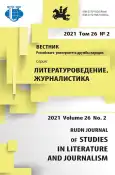Linguocultural Organization of the International Broadcasting in Russia Today
- Authors: Efendieva N.E.1
-
Affiliations:
- Russia Today
- Issue: Vol 26, No 2 (2021)
- Pages: 247-255
- Section: JOURNALISM
- URL: https://journal-vniispk.ru/2312-9220/article/view/318716
- DOI: https://doi.org/10.22363/2312-9220-2021-26-2-247-255
- ID: 318716
Cite item
Full Text
Abstract
In modern political and socio-cultural realities, a special role and importance are assigned to international broadcasting as a technology for positioning a content-producing country in the external environment, i. e. the global media space. The subject of this study is the explication of the specifics of the linguocultural organization of international broadcasting. The experience of Russia Today was taken as the flagship of international broadcasting in the Russian segment of the media space, through its activities influencing the formation of the geopolitical situation in the modern globalizing world. A complex of methods was used: historical and political analysis, structural analysis, contextual analysis, secondary analysis of sociological and statistical data. The empirical base was made up of four editions of the Sputnik Agency (Sputnik International, Sputnik Polska, Sputnik Türkiye, and Sputnik Belarus), representing various linguocultures - with differentiated ethnic and religious characteristics that have not only linguistic but also cultural manifestations in general. Based on the results of the study, it is concluded that the linguocultural organization of international broadcasting is considered as a means of implementing the diplomatic mission of the state-broadcaster with soft power tools in the globalizing world. It is based on the representation of positioning content, taking into account ethnicity, religion together with the linguistic and cultural characteristics of the audience. Both the effectiveness of promoting program statements and ideas and strengthening the country’s geopolitics depend on the degree of linguocultural orientation of international broadcasting activities.
About the authors
Nailya E. Efendieva
Russia Today
Author for correspondence.
Email: nailyaefendieva@gmail.com
Master of Philology, Editor, United International Broadcasting Directorate
4 Zubovskii Bulvar, Moscow, 119021, Russian FederationReferences
- Akopova, A.L. (2019). Genesis of modern internet broadcasting (on the example of the activities of the journalists of the radio company Voice of Russia and the German-language site Sputnik Russia Today). Bulletin of the Pyatigorsk State University, (2), 102–105. (In Russ.)
- Akopova, A.L. (2018). Innovative opportunities of electronic media (on the example of Russia Today). Voronezh State University Bulletin. Series: Philology. Journalism, (3), 100–102. (In Russ.)
- Ivanickaya, E.I., & Dmitriev, O.A. (2017). Russian international broadcasting today: From international propaganda to alternative information broadcasting. Media Almanakh, 1(78), 69–79. (In Russ.)
- Kizima, V.A. (2016). The main informational reasons in publications about European countries of Russia Today. In O.I. Lepilkina & A.M. Gorbachev (Eds.), Media Readings of NCFU: The View of Young Researchers: Collection of Competitive Materials of the All-Russian Scientific Seminar (pp. 100–102). Stavropol, NCFU. (In Russ.)
- Kurilov, A.E. (2016). Periodic fluctuations in the news field of Russian news agencies. Questions of Theory and Practice of Journalism, 5(1), 67–80. (In Russ.)
- Kurilov, A.E. (2016). The structure and mechanisms of the functioning of the news field (on the example of the news agencies Interfax, TASS, Russia Today) (Dissertation of the Candidate of Philological Sciences). Moscow. (In Russ.)
- Korobov, A.A., & Ryabov, A.A. (2020). News agencies as conductors of state information policy (on the example of TASS and Russia Today). Bulletin of the Volga Institute of Management, 20(3), 24–31. (In Russ.)
- Sorokina, V.S. (2017). The problem of the effectiveness of Russian international broadcasting in Europe and USA. Concept: Philosophy, Religion, Culture, 2(2), 127–136. (In Russ.)
- Levi-Stross, K. (2008). Structural anthropology. Moscow, Akademicheskii proekt Publ. (In Russ.)
- Yefanov, A.A. (2020). Sociology of media culture and media education. Moscow, Yurait Publ. (In Russ.)
Supplementary files









